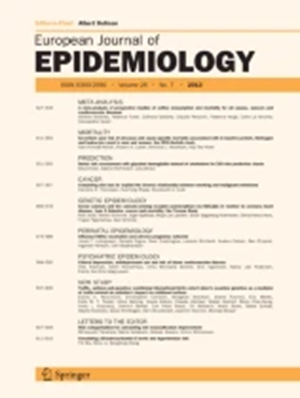Cohort profile: the CORDELIA study (Collaborative cOhorts Reassembled Data to study mEchanisms and Longterm Incidence of chronic diseAses).
IF 5.9
1区 医学
Q1 PUBLIC, ENVIRONMENTAL & OCCUPATIONAL HEALTH
引用次数: 0
Abstract
The CORDELIA Study (Collaborative Cohorts Reassembled Data to Study Mechanisms and Long-term Incidence of Chronic Diseases) combines 35 Spanish population cohorts to investigate the clinical, environmental, genetic, and omics determinants of cardiovascular disease in the Southern European population. It aims to conduct the largest genome-wide association study to date on cardiovascular disease in this population, improve predictions of cardiovascular incidence using genomic and clinical data, and identify subgroups that would benefit most from targeted pharmacological and lifestyle interventions. CORDELIA includes 196,632 individuals (ages 18-84, 54% female, 96% born in Spain, 20% with higher education, recruited from 1989 to 2020, with follow-up periods ranging from 5 to 30 years), with DNA samples available for 117,342 participants (60%). Of the participants, 24% were current smokers, 43% hypertensive, 11% diabetic, 15% medicated with lipid-lowering drugs, 44% overweight, and 27% obese. If not already available, genotyping is being performed using the Axiom™ Spain Biobank array (~ 750,000 variants, including 115,000 specific and 50,000 rare functional variants from the Spanish population). The cohort also includes incident events (coronary heart disease, stroke, heart failure, peripheral artery disease, hypertension, diabetes); date and cause of death; and harmonized data on risk factors (body mass index, waist circumference, lipid profile, blood pressure, glucose, creatinine), lifestyle (smoking, physical activity, diet, alcohol), and socioeconomic status. 99,019 participants (50%) also provide plasma samples. CORDELIA will significantly contribute to understanding the complex interplay of risk factors contributing to cardiovascular disease and advance the fields of precision medicine and public health in Southern European individuals.队列简介:CORDELIA研究(协作队列重组数据以研究慢性疾病的机制和长期发病率)。
CORDELIA研究(协作队列重组数据以研究慢性疾病的机制和长期发病率)结合了35个西班牙人群队列,调查南欧人群心血管疾病的临床、环境、遗传和组学决定因素。它的目标是在这一人群中开展迄今为止最大规模的心血管疾病全基因组关联研究,利用基因组和临床数据改进心血管发病率的预测,并确定将从靶向药物和生活方式干预中获益最多的亚组。CORDELIA包括196,632人(年龄在18-84岁之间,54%为女性,96%出生在西班牙,20%受过高等教育),从1989年到2020年招募,随访期从5年到30年不等),117,342名参与者(60%)可获得DNA样本。在参与者中,24%是吸烟者,43%是高血压患者,11%是糖尿病患者,15%在服用降脂药物,44%超重,27%肥胖。如果还没有,则使用Axiom™西班牙生物库阵列进行基因分型(约750,000个变体,包括来自西班牙人群的115,000个特异性和50,000个罕见功能变体)。该队列还包括突发事件(冠心病、中风、心力衰竭、外周动脉疾病、高血压、糖尿病);死亡日期和原因;并统一了风险因素(体重指数、腰围、血脂、血压、血糖、肌酐)、生活方式(吸烟、体育活动、饮食、饮酒)和社会经济地位的数据。99,019名参与者(50%)也提供了血浆样本。CORDELIA将大大有助于理解心血管疾病风险因素的复杂相互作用,并推进南欧个体的精准医学和公共卫生领域。
本文章由计算机程序翻译,如有差异,请以英文原文为准。
求助全文
约1分钟内获得全文
求助全文
来源期刊

European Journal of Epidemiology
医学-公共卫生、环境卫生与职业卫生
CiteScore
21.40
自引率
1.50%
发文量
109
审稿时长
6-12 weeks
期刊介绍:
The European Journal of Epidemiology, established in 1985, is a peer-reviewed publication that provides a platform for discussions on epidemiology in its broadest sense. It covers various aspects of epidemiologic research and statistical methods. The journal facilitates communication between researchers, educators, and practitioners in epidemiology, including those in clinical and community medicine. Contributions from diverse fields such as public health, preventive medicine, clinical medicine, health economics, and computational biology and data science, in relation to health and disease, are encouraged. While accepting submissions from all over the world, the journal particularly emphasizes European topics relevant to epidemiology. The published articles consist of empirical research findings, developments in methodology, and opinion pieces.
 求助内容:
求助内容: 应助结果提醒方式:
应助结果提醒方式:


